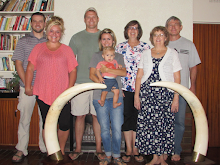New Missionaries are required to go through an intensive 3 week training course once they reach the field. The emphasis of this training is to help the new missionary value the importance of culture and language learning as well as the importance of personal evangelism. Our newest team member, Ramona Beam, attended 40/40 and this is her description of the experience.
Surviving 40/40
During October and November, I had the opportunity to travel to Burkina Faso in West Africa to attend 40/40, which is a month-long, intensive on-the-field orientation for new personnel serving in the Sub-Saharan Africa Affinity Group.
After some visa issues which delayed my travel for a few days, I arrived in Ouagadougou, Burkina Faso on a Sunday afternoon and immediately jumped into the training sessions.
The training is divided into three basic parts, each about a week long. The first week consisted of urban training, during which we went out in pairs, with a local translator, to assigned neighborhood to gather information and talk with people. Each day, we were given an assignment to ask questions about different topics, such as health issues, family issues, death and funerals, religion, etc. Each of these daily field assignments, or DFAs was designed to teach us how to ask the right questions to learn about culture when we return to our own places of ministry. We also had many opportunities to share Christ with people we came into contact with. Afternoons were spent in debriefing the morning times, as well as lectures on culture, religion, etc.
For week two, we traveled to Ghana, to the village of Nalerigu where there is a Baptist hospital and guest house. The training followed the same format as the previous week, except this time we were in a rural setting. It was really interesting to me to find that the answers to some of the same questions brought very different answers here in the villages.
A highlight of the week was our formal introduction to the Nayeri, or head chief. We were given an appointment, then at the proper time we were ushered into his receiving room, where he sat with all of the sub-chiefs or village elders. We were given the opportunity to ask him questions, then we were given the traditional gift of a cola nut.
Week three consisted of actually going out by twos and living in a village, with a local family. While this was by far the most physically challenging, with no electricity or running water, sleeping on mats on the floor, and no “facilities”, it was absolutely the most rewarding part of the training. We had the opportunity to get to know our host families, eating what they eat, working alongside them, and learning first-hand about their culture and lives. My partner and I were guests of Rev. George and his family in the village of Sulamboma. This village has over 1,000 people, and Rev. George is pastor of the Baptist church in the village, which has about 100 members.
Having the opportunity to share with this church, I with the ladies, and Becky, my partner, with the youth, was an amazing time.
The final week was spent back in Ouagadougoug, for a time of wrap-up, debriefing, and some additional training.
A highlight for me came during the week in Nalerigu. An excerpt from my journal for that week says, “Yesterday our DFA assignment was to interview someone about medicine and the spirit world. Augustino (our translator) took us to visit a chief here in Nalerigu town. It was all very proper, following the protocols for visiting a chief. We asked for permission to ask questions, then Becky (one of my partners) went through the questions on our list. Augustino had told us before we got there this man was a chief and a traditionalist, so we were surprised to hear that he immediately goes to the hospital when he or his family become ill. However, a bit more probing and he did say that before the hospital came, his grandfather had been a traditional “herbalist”.
Becky asked him if he remembered any stories from his grandfather. Though he didn’t seem to, that opened the door for me to say that we know his people have many stories handed down, and we also have stories. I asked him if we could share a story with him from God’s Word. He told us he has an older sister who follows God. He sees many good things in her life, and he would like to hear these stories. Aha! God had handed us the perfect opportunity to share Creation to Christ! I started and went through the first part, then Suzanne (another partner) took up the story with Jesus and finished out. When we were done, this old chief looked at us and said, ‘I have heard your story, and I thank you for coming to tell me. I want to follow the way of Jesus Christ.’”
In all, our group of 18 new missionaries were able to lead 33 people to Christ during the four weeks of 40/40. So, in addition to all the great information we gained that will help us in our own ministries, there are 33 new believers who will one day join us around the Throne, singing praises to Him who is worthy.
Saturday, January 15, 2011
New Missionary Training 40/40
Posted by Zim Team at 12:15 AM 0 comments
Labels: 40/40, New Missionary Training
Subscribe to:
Posts (Atom)





